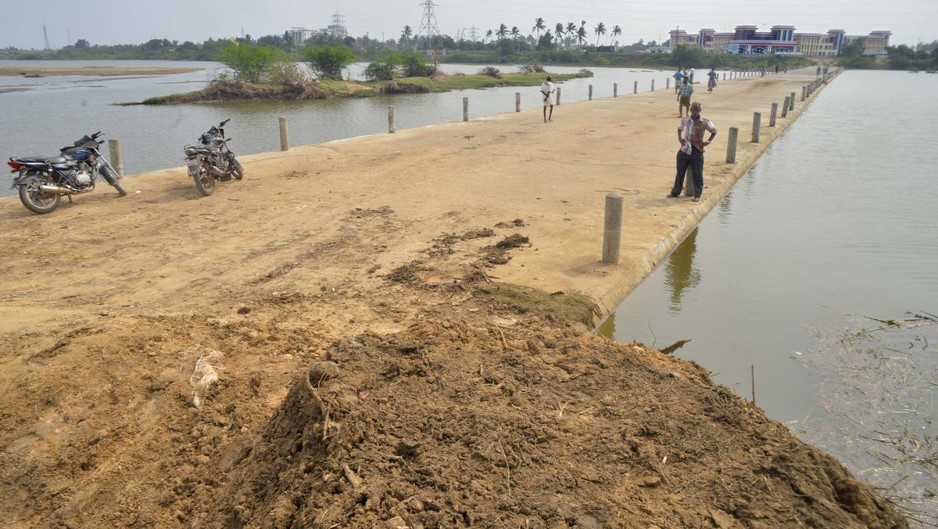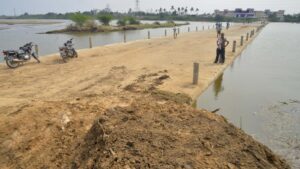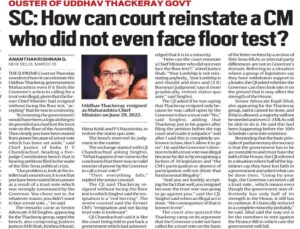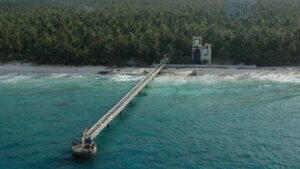
CURRENT AFFAIRS – 17/03/2023
Wait continues in T.N. for Centre’s Pennaiyar tribunal
As the three-month deadline fixed by the Supreme Court had expired last week, the State is waiting for Centre’s next course of action
With the time limit fixed by the Supreme Court for the constitution of an inter-State river water disputes tribunal for Pennaiyar river getting expired on Tuesday last, Tamil Nadu is waiting for the Centre’s next course of action.
In mid-December, the court gave the Centre three months to constitute the tribunal to resolve the dispute between Tamil Nadu and Karnataka over constructions across the river. In 2018, Tamil Nadu filed an original suit against Karnataka constructing checkdams and diversionary structures on the river. The direction came after the Centre had stated that Tamil Nadu’s complaint was referred to a Negotiation Committee, and there was “no likelihood of settlement by negotiation”. The Union government had also submitted that it was “likely to constitute a Tribunal to resolve the dispute between the two States”.
On November 30, 2019, Tamil Nadu formally requested the Union government to constitute a Tribunal for adjudication of disputes over the waters of the river, also known as Thenpennai. In its complaint, Tamil Nadu objected to the construction of a checkdam across the Markandeya, a tributary of the Pennaiyar, by Karnataka.
According to those following the case in court, the matter, which was originally listed for March 14, did not come up that day. There is an expectation that it may be heard next Tuesday (March 21).
GS Paper II: SC reserves judgement on Maharashtra political row
Justice P.S. Narasimha says there is no freedom in regional parties; Bench deliberates on whether Governor can call for trust vote on being approached by a group of MLAs who have left party
The Supreme Court on Thursday addressed former Maharashtra Chief Minister Uddhav Thackeray on how there is an “absolute” lack of freedom within regional political parties, which are mostly run by single families.
“There is absolutely no freedom in regional parties, except for one leader. Many a times, it is a family which runs it and there is no scope of anybody else coming into the frame. There is no alternative… it is impossible,” Justice P.S. Narasimha, one of the five judges on the Constitution Bench headed by Chief Justice of India D.Y. Chandrachud, orally observed.
The remark came during the final day of the hearing of the political dispute between Maharashtra Chief Minister Eknath Shinde and Mr. Thackeray on the control of the Shiv Sena party and the circumstances that led to the fall of the Maha Vikas Aghadi government in the State in 2022.
The Bench reserved the case for judgment.
Justice Narasimha’s observation came when senior advocate Kapil Sibal, for Mr. Thackeray’s side, said constitutional law found it “suspect” when legislators, suddenly, as a group, at the same time, one day, decided to resign from a ruling coalition, as was seen in Madhya Pradesh. The Kamal Nath government had fallen when some Congress MLAs resigned and joined rival BJP.
However, in Maharashtra, Mr. Shinde and his supporters had not resigned. “Naturally, they did not resign because they felt they would want to be Ministers in the new government. Resigning would have meant contesting elections, which they may or may not have won,” Mr. Sibal submitted.
The Chief Justice asked whether the Governor, oblivious to the provisions of the Tenth Schedule, could call for a trust vote if a group of MLAs came to him saying they have left the ruling party.
“Forget the Tenth Schedule, he (Governor) cannot call for a trust vote by recognising a faction in a political party which has no identity… which has no constitutional identity. They (these MLAs) cannot be seen as a group. They are individuals. There is no concept of a group within a legislature. Each is an individual. Government formation is only on alliances… Therefore, calling a trust vote should also be based on alliances,” Mr. Sibal responded.
The Chief Justice paraphrased Mr. Sibal’s reply by saying that, according to the senior lawyer, the Governor could only call for a trust vote if a member-party in a coalition shifts and not when individuals within a party leave.
SC: How can court reinstate a CM who did not even face floor test?
GS Paper III: NIOT to set up green, self-powered desalination plant in Lakshadweep
Stepping up from its ongoing initiative of providing potable water in six islands of Lakshadweep using Low Temperature Thermal Desalination (LTTD) technology, the Chennai-based National Institute of Ocean Technology (NIOT) is working at making this process free of emissions.
Currently the desalination plants, each of which provides at least 100,000 litres of potable water everyday, are powered by diesel generator sets — there being no other source of power in the islands. LTTD exploits the difference in temperature (nearly 15°C) in ocean water at the surface and at depths of about 600 feet. This cold water condenses water at the surface, that is warmer but whose pressure has been lowered using vacuum pumps. Such de-pressurised water can evaporate even at ambient temperatures and this resulting vapour when condensed is free of salts and contaminants and fit to consume.
However, the need for diesel power to reduce the water pressure means that the process is not fossil-fuel free and also consumes diesel, a precious commodity in the islands that has to be shipped from the mainland critical for powering the electric grid.
“For the first time in the world, probably, we are setting up a [desalination] plant that will also supply power to the plant,” said G.A. Ramadass, Director, NIOT, Chennai
Currently there were five desalination plants in operation in the Lakshadweep islands. Four more were expected to be functioning in the coming months. The proposed self-sustaining plant — the 10th — is expected to be ready later this year, he added.
The NIOT, an institute under the aegis of the Ministry of Earth Sciences (MoES), has worked for years on harnessing energy from the ocean. However, ocean thermal technology while plausible for islands, was unlikely to be useful for supplying power onshore. “For such plants to work we need a large gradient [difference in temperature between the surface and the ocean depths]. In Lakshwadeep these depths can be achieved fairly easily unlike, say, off the coast of Chennai. It will make the power produced this way extremely expensive,” M. Ravichandran, Secretary, MoES, told The Hindu.
While demonstration plants were funded by the MoES, the existing desalination plants were funded by the Lakshadweep administration. The Ministry provided technical assistance and the plants were commissioned via private industry, Mr. Ravichandran added.
GS Paper III: Govt: First test vehicle demonstration under Gangayaan likely in May
The first test vehicle demonstration (TV-D1) under the Gaganyaan mission is likely to take place in May this year, with the first uncrewed mission to be undertaken only after the success of two such demonstrations, according to the reply of Minister of State for Department of Space Jitendra Singh in Parliament on Wedesday. Two more test vehicle demonstrations will be undertaken before the second uncrewed mission, which will carry a pressurised crew module unlike the first uncrewed mission.
“As per the current schedule, the first uncrewed mission may be attempted by the end of the year, another uncrewed mission by mid-2024. The first crewed mission has been scheduled for late 2024 or early 2025. However, this will all depend on how the tests go,” said an official from the space agency.
The test vehicle demonstration has been designed to test the processes for aborting the mission mid-air, the parachute system that will bring the crew module down to sea, and the recovery of crew members from the module after splashdown. The demonstration will use a single liquid propellantbased rocket stage to carry the crew module to sub-orbital level.
“Although helicopter based air drop tests have already been carried out, a helicopter – or any airplane for that matter – cannot go to an altitude of say 10 km from the surface of the earth. The test vehicle missions will test all systems and processes at a much greater height,” said the official.
The mission was initially supposed to have only two uncrewed missions and then a crewed mission. The minister’s reply in Parliament, however, says, “Gaganyaan Advisory Council has recommended testing of Crew Escape System and deceleration systems through four abort missions using Test Vehicle (TV) and Integrated Air Drop Tests before proceeding with crewed missions. This is in addition to the two uncrewed missions planned earlier.”
GS Paper: EC’s proposal for e-postal ballot for overseas voters under discussion: Govt
An Election Commission proposal to facilitate electronically-transmitted postal ballot system for overseas Indian voters is under discussions with the Ministry of External Affairs to “iron out” logistical challenges involved in its implementation, Rajya Sabha was informed on Thursday.
In a written reply, Law Minister Kiren Rijiju also said the total number of overseas electors as on January 1 this year stands at over 1.15 lakh.
“The Election Commission of India has taken up a proposal to amend the Conduct of Elections Rules, 1961 to facilitate electronically-transmitted postal ballot system for overseas electors. The matter is under discussions with the Ministry of External Affairs to iron out the logistical challenges involved in the implementation of the proposal,” Rijiju said.
According to the EC website, as of now an overseas voter is not issued a photo identity card but they are allowed to vote in person at the polling station by producing their original passport.
The EC has maintained that overseas voters find it difficult to to fly down to India to cast vote.
The minister recalled that earlier, on the recommendation of the poll panel, the Representation of the People (Amendment) Bill, 2018, to enable the overseas electors to cast their vote either in person or by proxy, was passed by Lok Sabha in August, 2018.
The Bill was pending in Rajya Sabha for consideration but lapsed due to the dissolution of the 16th Lok Sabha.


